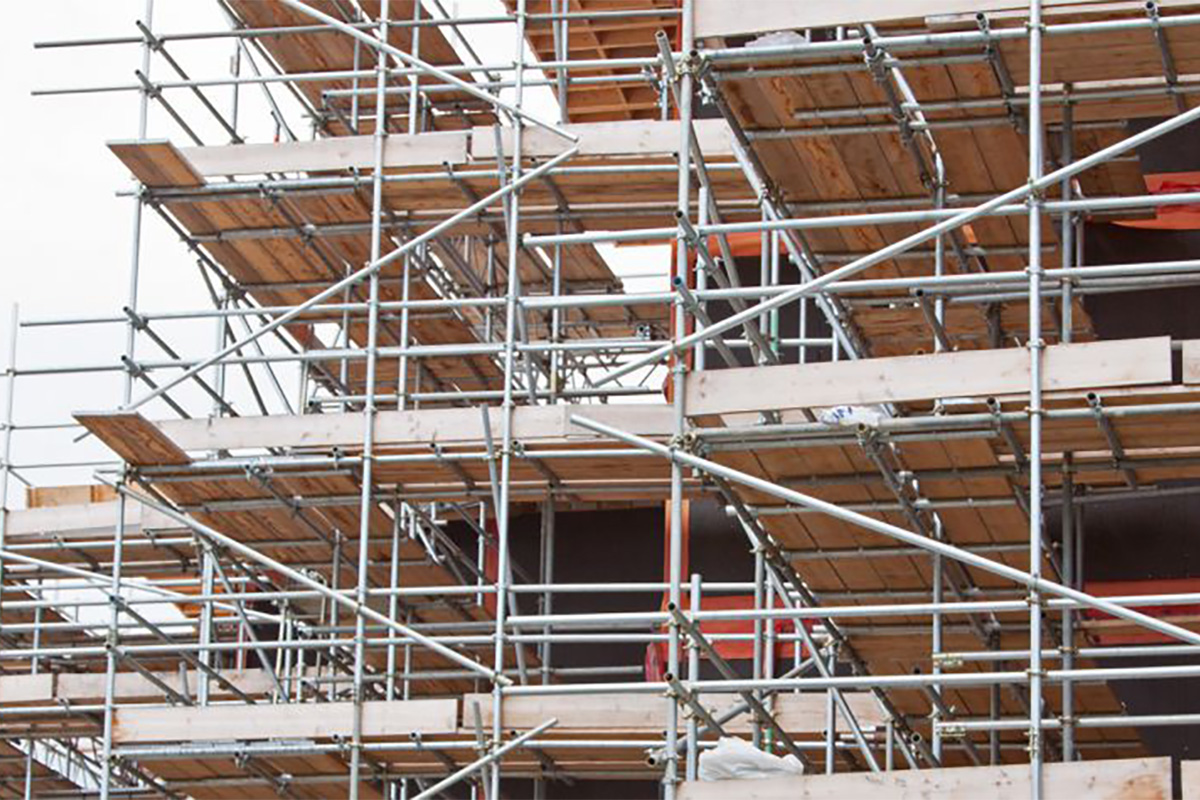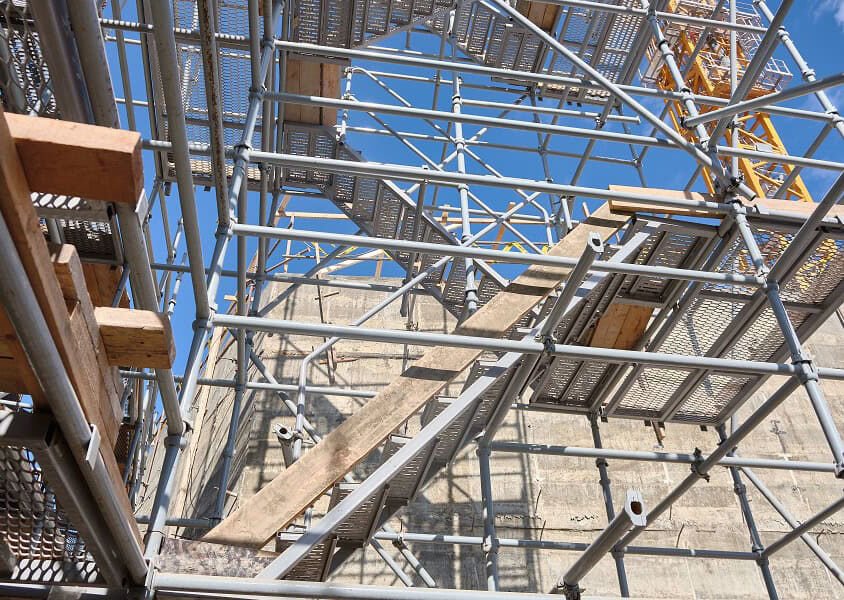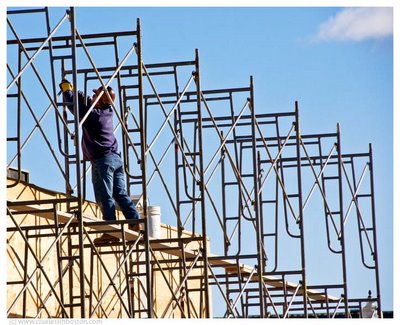Discover Leading Scaffolding Near Me for Your Home or Business Needs
Discover Leading Scaffolding Near Me for Your Home or Business Needs
Blog Article
Exploring the Different Types of Scaffolding Utilized in Building Jobs
The building industry counts heavily on various kinds of scaffolding to fulfill details task demands, each offering distinct benefits and applications. Conventional frame scaffolding gives a tough foundation for general tasks, while suspended scaffolding is vital for work with skyscraper structures. Various other options, such as system and rolling scaffolding, provide to performance and wheelchair, respectively. The cantilever variant proves very useful in metropolitan settings where space is constricted. Understanding the subtleties of these scaffolding kinds is essential for optimizing safety and security and efficiency on construction websites, motivating a closer exam of their unique characteristics and applications.

Conventional Structure Scaffolding
Standard framework scaffolding is among one of the most commonly utilized techniques in the construction market as a result of its robustness and convenience. This system includes horizontal and vertical frameworks that are assembled to develop a secure system for materials and workers. The main elements consist of vertical articles, horizontal ledgers, and angled dental braces, which together give a strong framework that can sustain considerable tons.
One of the essential benefits of traditional framework scaffolding is its flexibility to various construction projects, ranging from household buildings to huge business structures. The modular design permits simple setting up and disassembly, making it reliable for both long-lasting and temporary jobs. Additionally, the system can be personalized in height and size, fitting different building designs and website conditions.
Safety is critical in scaffolding applications, and traditional framework systems are geared up with guardrails and toe boards to protect against falls and make certain worker protection. Normal assessments and adherence to safety and security regulations are essential in preserving the honesty of the scaffold (Scaffolding). Generally, standard structure scaffolding continues to be a fundamental selection in the construction industry, providing a reliable platform for labor and boosting general project effectiveness

Suspended Scaffolding
Suspended scaffolding uses an one-of-a-kind option for construction tasks that require accessibility to raised surfaces, particularly in circumstances where standard frame scaffolding might be unwise. This kind of scaffolding is usually put on hold from the roofing system or upper degrees of a structure, using a system of systems, sheaves, and ropes to develop a functioning room that can be gotten used to various elevations.
One of the primary advantages of suspended scaffolding is its versatility. It can be conveniently repositioned or reduced to suit changes in building needs, making it optimal for jobs such as window installment, frontage job, and maintenance on skyscrapers. Furthermore, the marginal footprint of suspended scaffolding enables far better usage of ground area in city environments, where room is frequently restricted.
Safety and security is a crucial consideration in using put on hold scaffolding. Appropriate rigging and anchoring systems have to be employed to make sure stability and avoid accidents. Operators should additionally be trained in the secure usage of this devices. Overall, put on hold scaffolding supplies a reliable and efficient solution for accessing hard-to-reach locations in numerous building situations, enhancing both performance and security on site.
System Scaffolding
System scaffolding, frequently considered a modern-day browse around this site option in the scaffolding sector, consists of pre-engineered components that can be rapidly put together and adjusted for numerous building projects. Scaffolding. This sort of scaffolding is characterized by its modular layout, which enables versatility and performance on work sites, accommodating various elevations and structural needs
Commonly made from high-strength steel or light weight aluminum, system scaffolding offers improved longevity and stability. The components consist of vertical articles, horizontal journals, and angled braces, which interconnect safely, making certain a durable structure. The style often includes standard installations, streamlining assembly and disassembly procedures, consequently reducing labor time and costs.

Rolling Scaffolding
Moving scaffolding is a versatile option to standard fixed scaffolding, made for wheelchair and ease of usage why not find out more on construction sites. This type of scaffolding includes a system sustained by frames with wheels, allowing workers to conveniently relocate it as required. The wheelchair attribute substantially enhances performance, as it decreases downtime linked with dismantling and putting together taken care of scaffolding.
Commonly created from lightweight products such as light weight aluminum or steel, rolling scaffolding provides a tough yet portable remedy for tasks calling for regular repositioning - Scaffolding. It is especially advantageous in jobs such as painting, drywall installation, and electric work, where access to various heights and places is required
Safety is paramount in rolling scaffolding design, with features such as securing wheels to avoid unintentional movement when in operation, and guardrails to secure employees from drops. In addition, numerous versions are flexible in elevation, suiting different project requirements.
Cantilever Scaffolding

The layout of cantilever scaffolding generally involves utilizing arms or braces anchored to a structure or structure, allowing the platform to expand external safely. Safety is extremely important; hence, these scaffolds have to be engineered to stand up to numerous lots and ecological problems. Routine evaluation and upkeep are vital to ensure structural integrity and employee safety.
Cantilever scaffolding is preferred for its flexibility and reliable use of area, making it a preferred option in urban settings where space restraints are usual. It assists in easier accessibility to high elevations, inevitably contributing to the general efficiency of building tasks. Similar to all scaffolding kinds, correct training and adherence to safety and security requirements are crucial for employees utilizing cantilever scaffolding.
Final Thought
To conclude, the diverse sorts of scaffolding made use of in construction jobs each offer distinct purposes tailored to particular site needs. Traditional structure scaffolding offers security, while put on hold scaffolding uses convenience for elevated tasks. System scaffolding facilitates quick assembly, and rolling scaffolding enhances wheelchair for varying workplace. Cantilever scaffolding efficiently resolves challenges in urban setups. Understanding these scaffolding kinds is crucial for optimizing safety and security and efficiency in construction, ultimately contributing to the successful completion of tasks.
Standard framework scaffolding provides a sturdy foundation for general jobs, while suspended scaffolding is crucial for job on high-rise structures.Rolling scaffolding is a functional option to standard set scaffolding, created for wheelchair and ease of use on construction sites. As with all scaffolding kinds, proper training and adherence to security requirements are crucial for workers making use of cantilever scaffolding.
Traditional framework scaffolding provides stability, while put on hold scaffolding supplies adaptability for raised tasks. System scaffolding assists in fast assembly, and rolling scaffolding improves movement for differing job environments.
Report this page